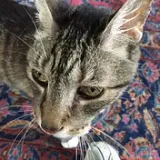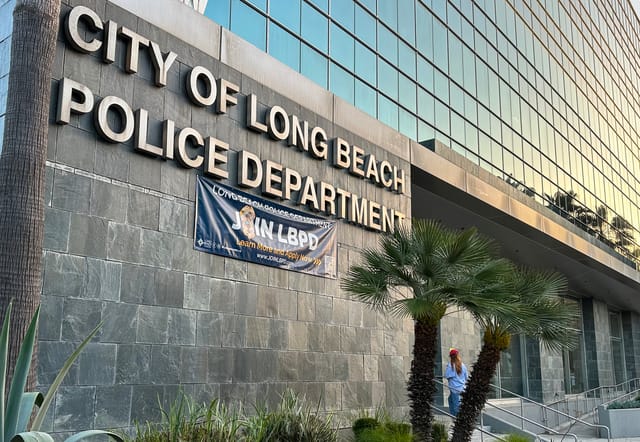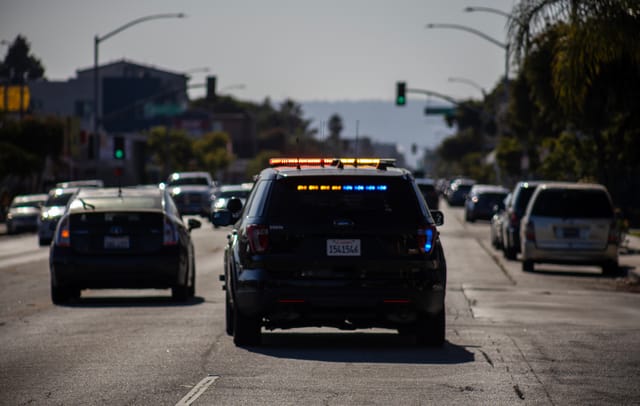Miss Cynthia’s home for peculiar pups
Local pet rescuer and advocate gives special-needs dogs ‘the best freaking time of their lives.’
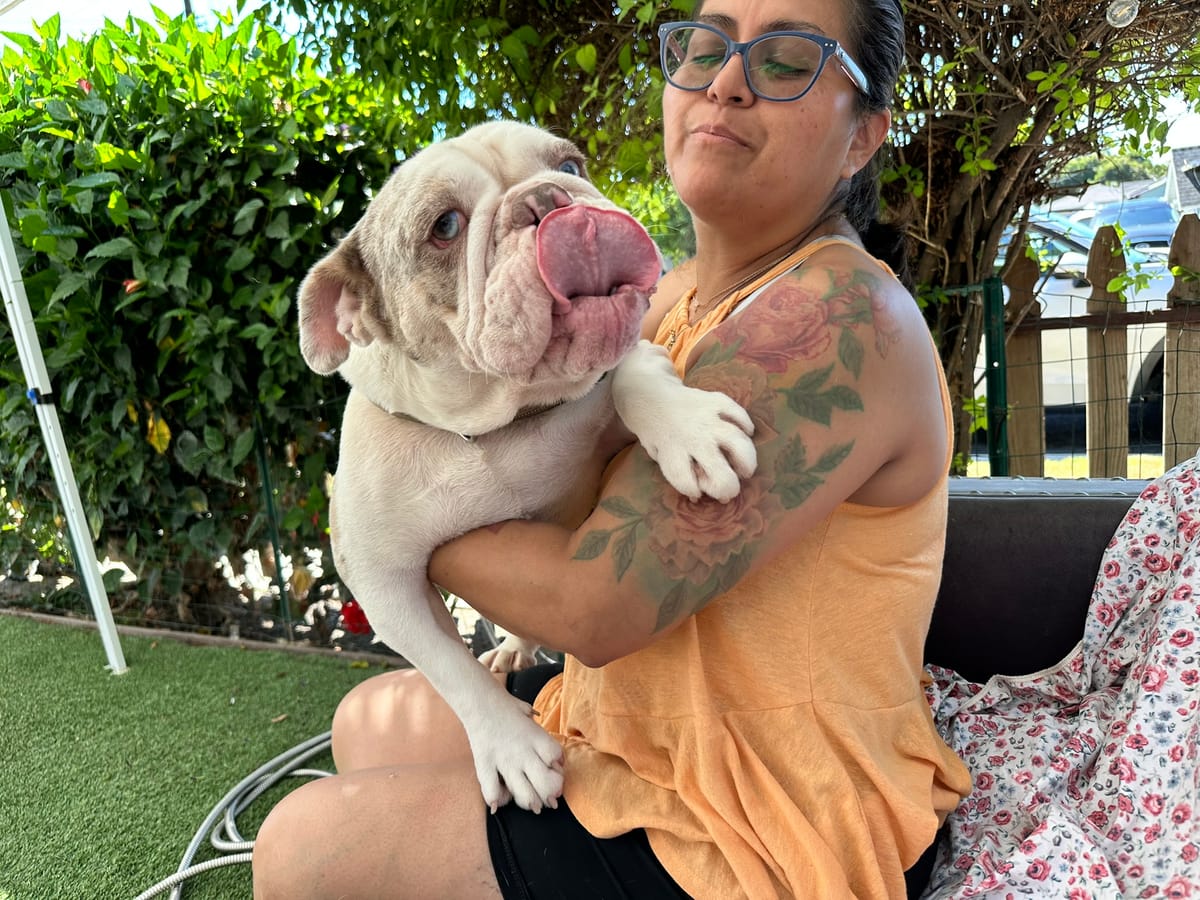
When you hear the word “peculiar,” you might equate it with “weird,” “strange” and “odd.” But at the cozy little house where pet advocate Cynthia Lopez lives with her human family, a couple of cats and about 12 dogs, 10 of which are fosters, it means “singular,” “unusual,” and “distinctive.” And “special” in all senses of the word, including “special needs.” And no — it’s not actually called Miss Cynthia’s Home for Peculiar Pups. After visiting there, I just couldn’t resist putting it in the headline.
“I just call it a home for special-needs dogs, but it’s really special-needs Disneyland!” Lopez said.
Dogs that no one wants are very much wanted there, and they know it. They enjoy ventilated cots in the front yard, a doggie pool in the back, mobility devices, nutritious food and snacks, activities and friends of all number of legs — everything a special needs dog needs and wants.
I often think of Lopez as a saint, but that detracts from how humble and real she is. What she does is incredibly hard, but she makes it look simple, and her love of it all is evident. Lopez has fostered (and occasionally foster-failed) special-needs dogs for years, all while volunteering at Long Beach Animal Care Services and her personal outreach, which assists unhoused people and their pets. She also holds down a job as a medical assistant to pay for all the stuff, although donations help (here you go). And she’s a cancer survivor.
Lopez was likely born with empathy for suffering and the determination to take action for the sake of the unwanted and unhappy, especially if they’re animals. She knows it’s more than cuddling and cooing — helping the animals live their best lives with their disabilities is the total of her work.
The first time I saw her helping a special-needs dog was before the pandemic, when she and some friends were coaching a neurologically impaired dog named Keanu to swim in a backyard pool. Keanu later got adopted, and Lopez saw the importance of water in an impaired dog’s life. It helps them with movement, she said, and it’s good for the dogs to experience water and desensitize any fear they may have of it.
It’s also a lot of fun for them! Lopez throws pool parties for her fosters and invites the neighbor dogs, several of whom are Lopez alumni.
“I have a lot of dogs around here that were my fosters, and my neighbors adopted them,” she said.
Wilma, a young English bulldog with one eye and several disabilities, enjoys a pool party with a couple of the little kids. Video courtesy of Cynthia Lopez
Lopez said that many English and French bulldogs not bought from responsible breeders have serious disabilities. Irresponsible overbreeding by unlicensed breeders who want to make a quick buck and couldn’t care less about the health of either the puppies or the dams cause the problems. The castoffs fill shelters, rescues and euthanasia chambers.
“Wilma is one of the worst cases of an overbred English bulldog I’ve seen,” Lopez said. “She was abandoned outside a kennel facility. One of her eyes was poking out of her face, and it had to be removed. Also, her mammaries were so overused that one of them was dragging on the ground. She could not walk without stepping on her own little teats. She had a fresh incision from a cesarean [bulldogs frequently need this procedure to help them give birth]. This poor dog was grossly overbred, and she’s not even 3 years old. She’s the sweetest dog, and she has to run around with one eye and saggy boobs!”
English and French bulldogs sold online or through flyers often present the owners with hundreds of dollars in veterinary bills and die if they’re not addressed. Wilma is one of these dogs.
“They are just grossly overbred,” Lopez said. “The people that are breeding these poor dogs, they’re not taking into account all their issues. They’re just seeing a dollar sign because they’re so popular. A lot of these dogs are of a size that shouldn’t even exist. I have three English bulldogs now that are referred to as micro because they’re so little. And they all have problems. One of them is 24 pounds!”
The ideal weight for an English bulldog is 40 to 50 pounds. Lopez said that problems that can arise from irresponsible bulldog breeding can include deformed spines; megacolon, which affects defecation; spina bifida; and double-incontinence (urination and defecation).
“The way the small bulldogs are bred affects the way the organs are formed,” she said. “They’re supposed to be for a dog of a certain size, and they get malformed because of the microbreeding.”
Special needs dogs, like any population, are diverse in their needs and personalities. Disabilities can be neurological, birth defects, blindness and deafness, a trauma such as paralysis from a car accident, and even morbid obesity, which can cause skeletal deficiency. Behavioral issues, which an animal can have even if they don’t have special needs, can complicate therapy.
If a behavioral issue makes therapy next to impossible for Lopez, she reaches out to the rescue to see if they can come up with a solution for what the dog needs, whether it’s in Lopez’ home or at a different foster where Lopez can help as a consultant.
Disabilities can last a lifetime, and they’re not addressed can affect the quality of life for the animal. Several local rescues, shelters and veterinarians know that Lopez works with and cares for special-needs dogs and contact her when they have one. If she can handle it, which she usually can, she accepts the dog. If she’s at capacity, she’ll try to move a dog who’s doing well to another foster before making a decision about the new one.
“I feel that these are dogs that no one else takes,” she said. “You can’t find fosters for double-incontinent dogs, you can’t find fosters for hydrocephalic dogs [buildup of cerebrospinal fluid in the brain cavity], for dogs with neurological problems. People may think, I can’t deal with the work it’s going to take, or what if I lose the dog, it’s going to be so sad. But I think it’s important to take our emotions out of the equation. Yeah, it’ll be sad if we lose the animal, but what about the animal’s emotions? What about us providing them with the best freaking time of their lives for whatever time they have left? Don’t they deserve this?”
Two of the dogs, one of whom will never leave special-needs Disneyland, have no independent mobility and need custom wheelchairs, like the one made universally visible by Wheely Willy, the late Long Beach celebrity Chihuahua. Alan, 3 years old, doesn’t have a cerebellum, which affects mobility. Al isn’t particularly fond of his chair, and getting him into it is always a struggle. Once in the chair, however, he trots around contentedly.
Lief, on the other paw, loves his chair. Lief has an underdeveloped brain stem, which resulted from a glitch in oxygen reaching his brain when he was in his mom’s womb. Lopez has had him since he was 3 months old. He’s now 4, and Lopez isn’t giving him up ever.
“He’s my baby, and I love him so much!” she said, with emotion. “He’s the friendliest dog out there!”
Getting a big boy like Lief into a wheelchair is easier than you’d think, once you get the hang of it. Lief would have no independent mobility without it, and Lopez believes that he understands that it helps him move.
Video by Kate Karp
Neither Lief nor Alan is in any pain, and both can eat and drink on their own, with a couple of modifications like putting their bowls on stands. They’re both housebroken— Lief won’t go potty if he’s not in his wheelchair.
“His handicap doesn’t X out his capacity to learn,” Lopez said. “You know — children who are born different adapt to their life. He’s kind of the same way!”
Lopez has helped Lief turn his disability into an ability with visits to Long Beach public schools for humane education.
“Lief’s message is really important: different is beautiful,’” Lopez said. “He’s handicapped, but he’s a happy dog.”
Lopez frequently gets calls from people who want to adopt or foster one of her dogs or just “do what you do.” She’s always glad to educate them to see if they’re up to the task.
“I welcome people into my house all the time,” she said. “I can show you what works, how to change diapers, how to express a bladder, how to keep them clean. It’s not hard — It’s just when you’re new to it, it will take a lot of time and patience, patience being key. But once you get into a routine, it becomes one of the easiest things you can do.”
Lopez suggests that anyone wanting to adopt, foster or otherwise work with a special-needs dog should check what each dog’s needs are and whether the person has the capacity and patience for the task.
“Question your intentions: are you really doing it for the animal or for yourself, or for both, or other reasons?” she said. “At the end of the day, we have to meet their expectations. They don’t have to meet ours.”
Lopez invites interested potential fosters to spend the entire day with her and follow her around as she does her routines. She allows certain people who develop a rapport with a dog to take them home for a weekend to see how they both do.
Resources are available for people who decide to adopt or foster special-needs dogs.
“It really has improved in the last couple of years where there’s more acceptance, more talk of allowing the dogs to live,” Lopez said. “There are more companies that make certain things for pet parents, like the wheelchair companies for Lief and Alan. We have organizations that are very focused on helping parents keep their pets for a lifetime.”
Lopez recommends the group page Wild Hearts, which offers education, resources and other forms of help. Searching for group pages on social media and the internet, using the key words “special needs dog resources,” will produce results, which the person should carefully review.
Of course, Lopez is an excellent resource. If your own dog should become disabled in any way, she’ll help.
“There’s now a community of people who’ve experienced this who are there for each other,” she said. “Just because this is happening to your pet doesn’t mean you have to say goodbye right away. We can support you by providing you with resources, we can help sponsor a temporary wheelchair, we can show you how to put your dog in a wheelchair. We can help you find holistic veterinarians to provide you a different approach to your science-based veterinarian.”
Any truly compassionate and empathetic human knows that helping a pet lead their best life may involve helping them leave it, and Lopez is both truly compassionate and realistic.
“If a dog’s quality of life is so bad that they’re in pain that cannot be alleviated, euthanasia may be kinder,” she said. “Because yes, there are cases where animals are in discomfort. If it’s unmanageable, you have other conversations with your veterinarian.
“But,” she continued with a smile, “my dogs are happy! And they’re healthy! If an animal that’s born different ends up at the shelter, no one’s giving them the chance. Aren’t we a community of animal advocates who we’re supposed to provide second chances? So, why would we discriminate against an animal who’s born different?”
Access this link for Cynthia Lopez’s wish list, resources pages, and other helpful information. Follow her work on her Instagram page.
YOURS DROOLY
If you want to adopt or help foster a particular dog from Lopez’ “Special Needs Disneyland,” message her on her Instagram page or email her at cyn.lopez.84@icloud.com. She’ll then contact that particular dog’s rescue for an application, which she’ll send you.
After you complete the application, Lopez will review it. Then, she’ll set up a phone interview with you, then two or three meet-and-greets at the home, and finally, if all goes well, you and the dog will have a “day date” to see if you can both handle a full day together.
“It may seem that we’re making the process a little longer, but we’re doing it for the benefit of the dog,” Lopez said.
Here are three candidates. They passed the kiss test with me. Send Lopez a message if you want to meet one of them!
Georgie
Georgie has an incontinence problem, but he wears diapers to handle it, so no worries. He’s ridiculously friendly!
Raven
Raven doesn’t seem to be aware that she has a disability. She’s blind but gets around great!
Wilma
You read about poor Wilma in the article. However, if you think you’re about to see a sad sack, think again!
TAIL-WAGGIN' AND NOSE-BOOPIN' EVENTS
Friends of Long Beach Animals Casino Night
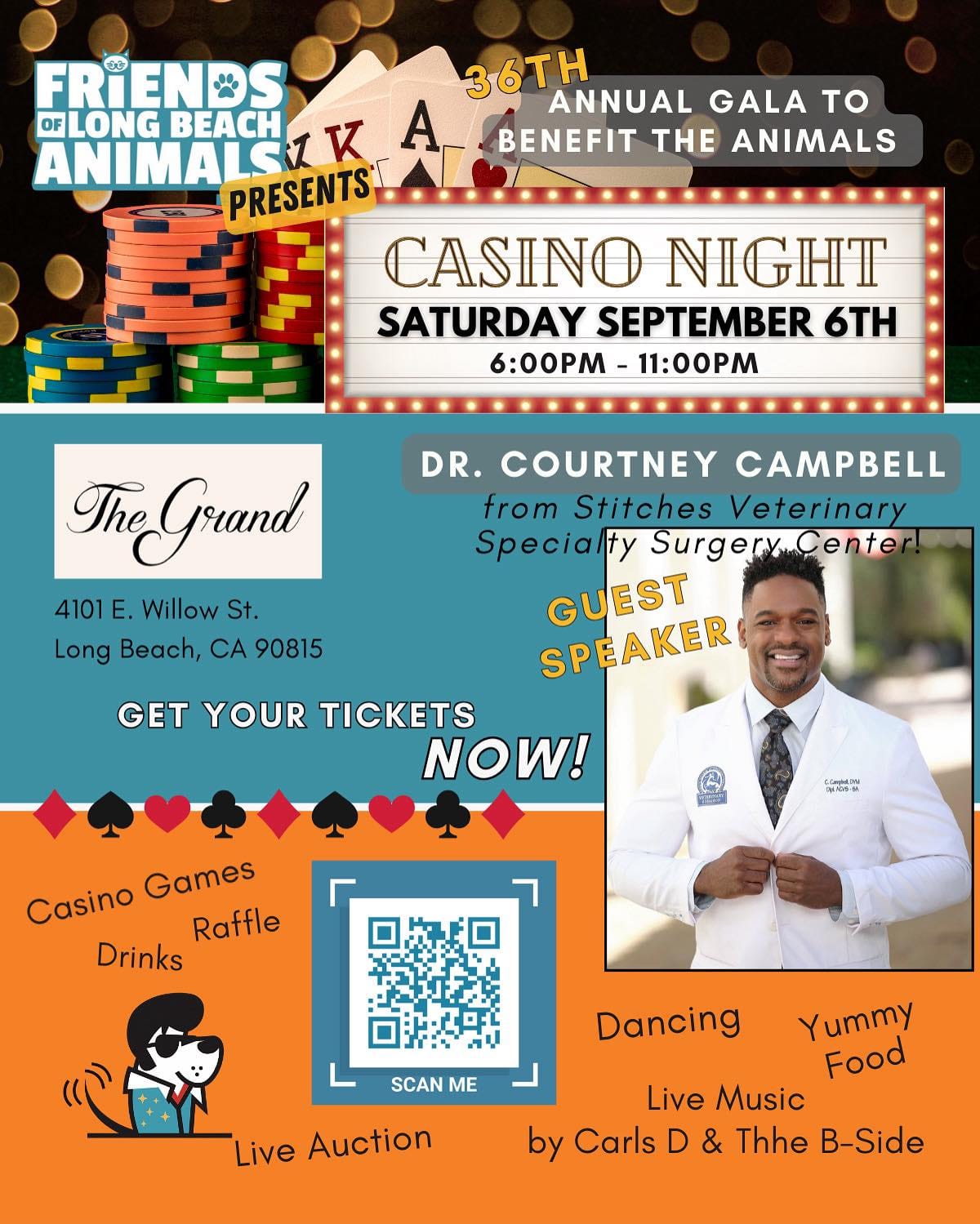
Friends of Long Beach Animals (FOLBA) is hosting its 36th Annual Gala and Fundraiser, and tickets are going fast! The evening will feature great food, lively entertainment, casino tables, an incredible live auction and guest speaker Courtney Campbell, DVM, DACVS-SA, owner of Stitches Veterinary Surgery in Long Beach.
All proceeds will support FOLBA’s mission to protect and improve the lives of animals in our community by providing vital programs like spay/neuter services, emergency veterinary care, and support for our local shelter and rescue partners. Dress like a player, but don’t bring the cat — the roulette ball won’t make it through a single spin.
Casino Night will take place Saturday, Sept. 6, 6 p.m.–11 p.m., at The Grand, 4101 E. Willow St., Long Beach. Tickets $100, available here. Reserve a table of 10 for $1,000.
Blessing of the Animals and Pet Fair
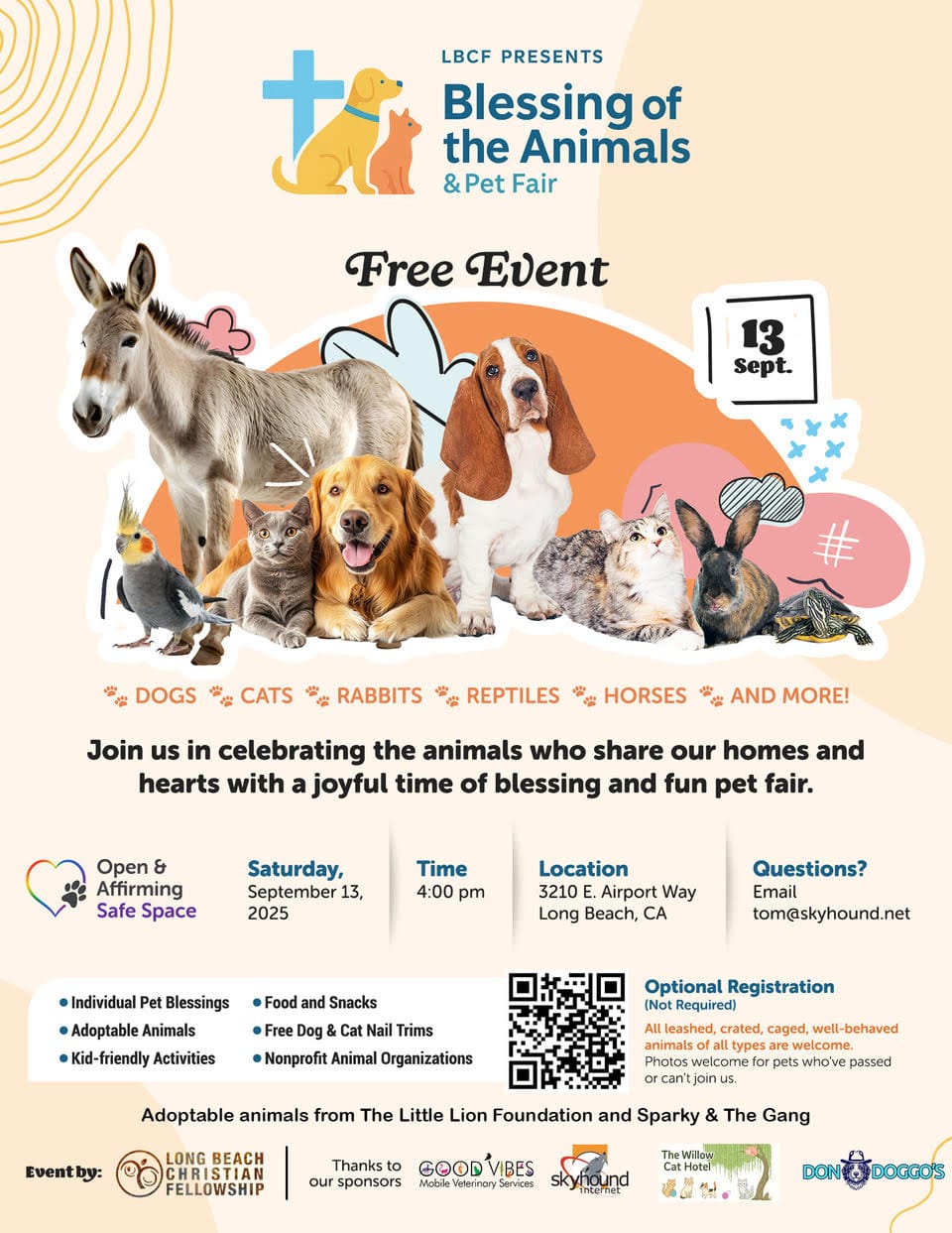
Animals both domestic and wild bless our lives daily, so how about we return the favor? Join the Long Beach Christian Fellowship for individual blessings and activities for kids! Of course, bring your well-behaved pets, and remember to either keep them on a leash or in a carrier. Don’t have a pet? Sparky and the Gang and The Little Lion Foundation will have adorable ones for you to adopt! See graphic for details.
The Blessing of the Animals and Pet Fair takes place Saturday, Sept. 13, beginning at 4 p.m. at the Long Beach Christian Fellowship, 3210 E. Airport Way, Long Beach. Free event.
Pet adoption and vaccine/microchip clinic at Fiesta in the Park
Take a walk on the west side to a celebration that includes live music and dancing, food trucks, free food for kids, art workshops, and giveaways. Enjoy bounce houses, face painting, and even a video game arcade pop-up and a build-your-own skateboard station! Get acquainted with Long Beach’s resources, including our shelter at Long Beach Animal Care Services!
Bring your dog or cat (on leashes or in carriers, of course) and get them their vaccines and microchips (bring your vaccine paperwork if you can). No pet? The Adoption Waggin’ will be there with cats and dogs to adopt!
Fiesta in the Park takes place Saturday, Sept. 13, noon–5 p.m. at Admiral Kidd Park, 2125 Santa Fe Ave., Long Beach
Need a low-cost veterinarian, information about trapping community cats, places to volunteer, rescues and shelters to adopt from — anything pet related? Follow this link for resources. Please add your own ideas in the Comments section.
We need your support.
Subcribe to the Watchdog today.
The Long Beach Watchdog is owned by journalists, and paid for by readers like you. If independent, local reporting like the story you just read is important to you, support our work by becoming a subscriber.

